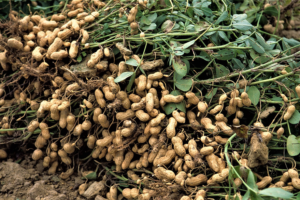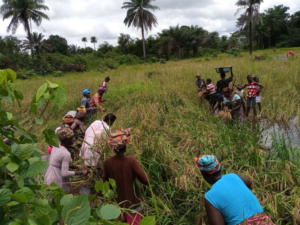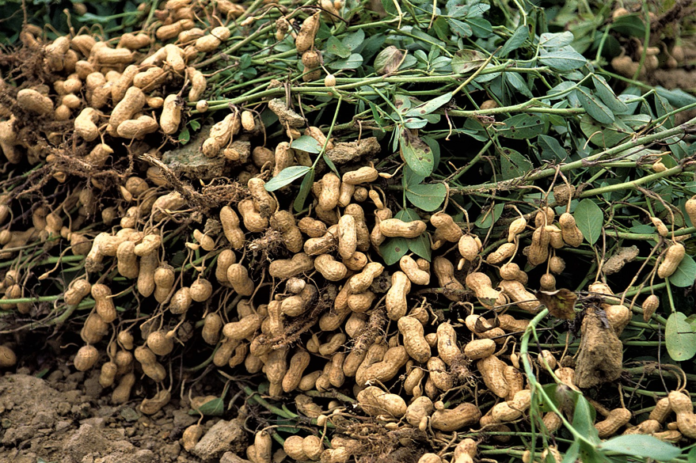By: Christian Conteh
The outbreak of COVID-19 has had an immeasurable impact on the African population particularly those between the middle and lower level manpower categories. One of the hardest hit are small scale farmers in rural Gambia and Sierra Leone, the majority of who believe in small-scale agriculture for their food security and incomes.

Gambia is arguably one of the largest exporters of groundnut in the sub-region.
Even before the advent of COVID-19, the sector had been faced with a plethora of challenges, including, lack of access to markets, finance, storage, and transportation among others.
The presence of COVID-19 poses a severe challenge not only to food security and incomes of the rural farmers but also to the entire economy of the two West African Countries. There is no doubt that the scourge will put rural farmers, particularly women-headed households, in extreme poverty.
Sahr O Falla is the District Youth Chairman in charge of the Chiefdom Youth Farm at Baoma Nimikoro Chiefdom in Kono District, he said on average amidst the COVID-19 the farm is doing relatively well. He however lamented about challenges including limited capacity, late supply of seeds, unavailability of fertilisers and herbicides to kill the grass among others, all because of the change in processes and procedures caused predominantly by COVID-19.
“Before COVID-19 government provided most of what is needed to ensure the farm does well, but now resources have to be diverted to the fight against the virus,” Sahr O Falla revealed.
He however expressed optimism that there would be better yield next year if their challenges are addressed and COVID is tackled.
Similarly, COVID-19 has proven a real threat to The Gambia’s rural population, this is as a result of the extraordinary measures taken by the government to combat the spread of the disease. Among these, the closure of local weekly markets (lumos) is particularly devastating for small-scale farmers. Various rice and vegetable farmers’ organizations have already reported difficulties in buying and selling because of lumos closures across the country.
“We are not even sure whether we will have farm inputs this year,” says Hawa Jagne, President of the Boiram Farmers’ cooperative.
The effects of the pandemic are also exacerbating long-standing challenges to The Gambia’s food security. Yields of staple cereal crops have been declining steadily for the past 10 years compared to the rest of West Africa, resulting in increasingly heavy reliance on food imports. Now, with heightened potential for food crises, the lives and livelihoods of much of The Gambia’s rural population are in danger.
While the COVID-19 pandemic is exacerbating risks for the entire rural population, the impact will undoubtedly be particularly severe on the livelihoods of women. Like many rural women, Gambian women are largely dependent on the informal economy and the agribusiness sector. Shocks affecting these sectors could spell a drastic decrease (or absence) of the income that is critical for maintaining their families’ food and health needs.
At Gibina Pujehun, Southern Sierra Leone Adama Swarray explained that her over 50-acres farmland did not do as well as she anticipated since COVID-19 reduced her workforce considerably.

Women harvesting rice at Gibina, Pujehun, Southern Sierra Leone
“As you can see the weeds have overrun the rice, during the lockdown periods we couldn’t come out to work and most of the young people who use to work for me are looking for other means of sustenance,” Adama said.
Adama’s ordeal is similar to that of Mariatu Fobbie who is caretaker of 150-hectare farmland in the riverine community of Gbondapi, Southern Sierra Leone. The only difference is that Mariatu’s farmland did better since it was cultivated in the river.
“I was lucky to have a good harvest this year but I couldn’t transport as much as I wanted to the big markets due to the travel restrictions, this is why I pray COVID-19 becomes a thing of the past soon,” Mariatu said.
Kai Sama Mondeh is Chiefdom Youth Leader at Sandor, he revealed that the farm there was cultivated by a small number of young men who he had engaged regularly since the majority of the youths already had their own small personal farms, and most had abandoned farming following the restriction on movement of persons and goods in a bid to curtail the COVID-19 virus.
“COVID-19 has affected me greatly, I had just harvested some large amount of vegetables when the second lockdown was announced, most of the produce perished before I could take them to the big market,” Mondeh said stressing that the challenges they have encountered are many.
Overall COVID-19 Pandemic affected the movement of farm products from rural to urban centres. The transport system slowed down considerably, and at times, it was unavailable because of travel restrictions. This led to only a few people turning up to open markets. The situation caused several products, such as tomatoes, fruits and vegetables to perish, ultimately creating a loss of revenue.
It is also important to note that government extension officers in Sierra Leone did not effectively carry out their functions owing to travel restrictions. This means that much of the agricultural information flow that is normally given to farmers was curtailed. In the prevailing environment, farmers had to either adjust to other income-generating activities or wait for the situation to normalise.
The Impact of COVID-19 on Small Scale Farmers in Gambia and Sierra Leone call for an urgent look at the situation and a need for critical answers on what needs to be done to alleviate their plight.




